精锐教育 初中讲义 被动语态
- 格式:doc
- 大小:110.50 KB
- 文档页数:11
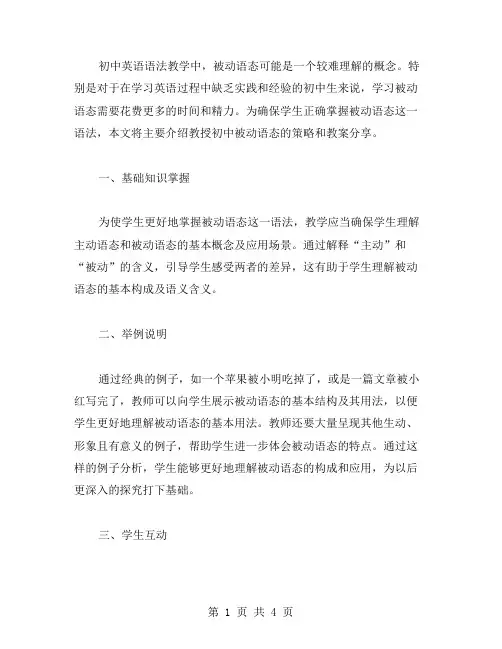
初中英语语法教学中,被动语态可能是一个较难理解的概念。
特别是对于在学习英语过程中缺乏实践和经验的初中生来说,学习被动语态需要花费更多的时间和精力。
为确保学生正确掌握被动语态这一语法,本文将主要介绍教授初中被动语态的策略和教案分享。
一、基础知识掌握为使学生更好地掌握被动语态这一语法,教学应当确保学生理解主动语态和被动语态的基本概念及应用场景。
通过解释“主动”和“被动”的含义,引导学生感受两者的差异,这有助于学生理解被动语态的基本构成及语义含义。
二、举例说明通过经典的例子,如一个苹果被小明吃掉了,或是一篇文章被小红写完了,教师可以向学生展示被动语态的基本结构及其用法,以便学生更好地理解被动语态的基本用法。
教师还要大量呈现其他生动、形象且有意义的例子,帮助学生进一步体会被动语态的特点。
通过这样的例子分析,学生能够更好地理解被动语态的构成和应用,为以后更深入的探究打下基础。
三、学生互动在授课中,可以利用小组分组形式进行交流和互动,促进学生之间的讨论和思考。
通过互动的形式,学生们可以相互提问、讨论和交流,分享各自的思考和理解,这将有助于弥补学生个体差异和不同学习风格的问题,在分享的过程中,学生也更容易理解和吸收所学的知识。
而且,这种授课方式有利于提高学生的综合能力,加强小组间的协作和竞争氛围,可以更好地调动学生的积极性和主动性,同时还有利于学生的思想启示和创新思维。
四、应用结合为了帮助学生更好地掌握被动语态这一语法,需要将所学的理论知识应用于实际生活中。
例如,老师可以让学生自己设计一个简单的情景对话,让学生运用被动语态来构建对话中的语言,这将有助于学生实践并巩固所学的知识。
教师还可以根据教材内容和学生的年龄水平设计其他的应用实例,帮助学生更好地理解和应用被动语态。
五、教案分享以下是一个初中被动语态教案的分享,教师可以参考其中的方法和步骤,以便更好地教授初中的被动语态。
教学目标:1. 了解被动语态的基本用法;2. 学会构造和使用被动语态;3. 能够正确理解和应用被动语态。

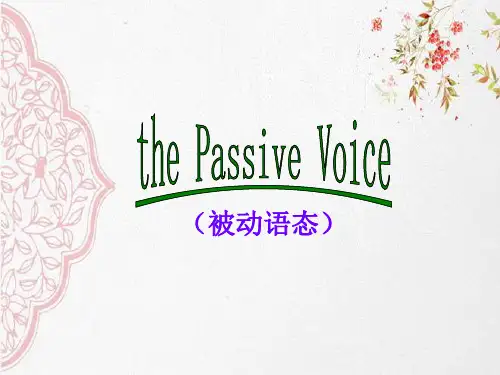
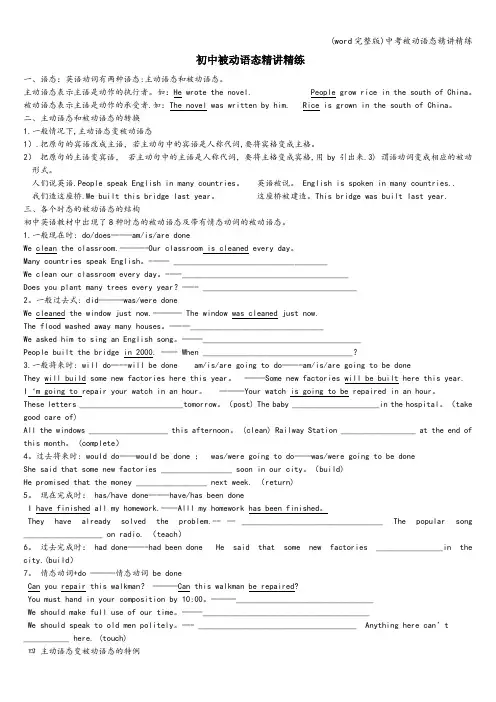
初中被动语态精讲精练一、语态:英语动词有两种语态:主动语态和被动语态。
主动语态表示主语是动作的执行者。
如:He wrote the novel. People grow rice in the south of China。
被动语态表示主语是动作的承受者.如:The novel was written by him. Rice is grown in the south of China。
二、主动语态和被动语态的转换1.一般情况下,主动语态变被动语态1).把原句的宾语改成主语,若主动句中的宾语是人称代词,要将宾格变成主格。
2)把原句的主语变宾语,若主动句中的主语是人称代词,要将主格变成宾格,用by引出来.3) 谓语动词变成相应的被动形式。
人们说英语.People speak English in many countries。
英语被说。
English is spoken in many countries..我们造这座桥.We built this bridge last year。
这座桥被建造。
This bridge was built last year.三、各个时态的被动语态的结构初中英语教材中出现了8种时态的被动语态及带有情态动词的被动语态。
1.一般现在时: do/does—-—am/is/are doneWe clean the classroom.-——--Our classroom is cleaned every day。
Many countries speak English。
-—— _____________________________________We clean our classroom every day。
-—-________________________________________Does you plant many trees every year?-—- _____________________________________2。
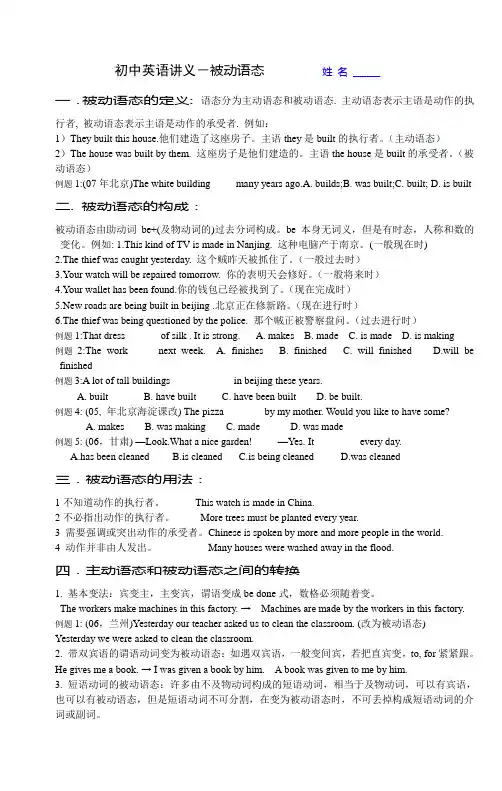
初中英语讲义-被动语态姓名 ______一.被动语态的定义: 语态分为主动语态和被动语态. 主动语态表示主语是动作的执行者, 被动语态表示主语是动作的承受者. 例如:1)They built this house.他们建造了这座房子。
主语they是built的执行者。
(主动语态)2)The house was built by them. 这座房子是他们建造的。
主语the house是built的承受者。
(被动语态)例题1:(07年北京)The white building ____ many years ago.A. builds;B. was built;C. built; D. is built 二. 被动语态的构成:被动语态由助动词be+(及物动词的)过去分词构成。
be本身无词义,但是有时态,人称和数的变化。
例如: 1.This kind of TV is made in Nanjing. 这种电脑产于南京。
(一般现在时)2.The thief was caught yesterday. 这个贼昨天被抓住了。
(一般过去时)3.Y our watch will be repaired tomorrow. 你的表明天会修好。
(一般将来时)4.Y our wallet has been found.你的钱包已经被找到了。
(现在完成时)5.New roads are being built in beijing .北京正在修新路。
(现在进行时)6.The thief was being questioned by the police. 那个贼正被警察盘问。
(过去进行时)例题1:That dress ______ of silk . It is strong. A. makes B. made C. is made D. is making例题2:The work _____next week. A. finishes B. finished C. will finished D.will be finished例题3:A lot of tall buildings ____________in beijing these years.A. builtB. have builtC. have been builtD. be built.例题4: (05, 年北京海淀课改) The pizza _______ by my mother. Would you like to have some?A. makesB. was makingC. madeD. was made例题5: (06,甘肃) —Look.What a nice garden! —Y es. It every day.A.has been cleanedB.is cleanedC.is being cleanedD.was cleaned三.被动语态的用法:1不知道动作的执行者。
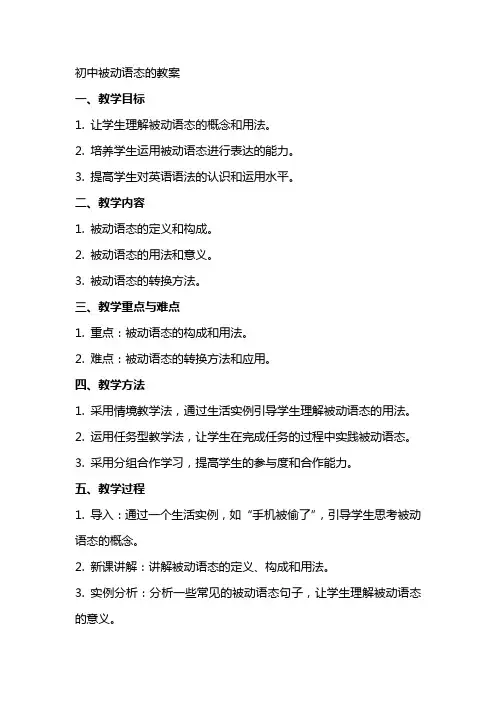
初中被动语态的教案一、教学目标1. 让学生理解被动语态的概念和用法。
2. 培养学生运用被动语态进行表达的能力。
3. 提高学生对英语语法的认识和运用水平。
二、教学内容1. 被动语态的定义和构成。
2. 被动语态的用法和意义。
3. 被动语态的转换方法。
三、教学重点与难点1. 重点:被动语态的构成和用法。
2. 难点:被动语态的转换方法和应用。
四、教学方法1. 采用情境教学法,通过生活实例引导学生理解被动语态的用法。
2. 运用任务型教学法,让学生在完成任务的过程中实践被动语态。
3. 采用分组合作学习,提高学生的参与度和合作能力。
五、教学过程1. 导入:通过一个生活实例,如“手机被偷了”,引导学生思考被动语态的概念。
2. 新课讲解:讲解被动语态的定义、构成和用法。
3. 实例分析:分析一些常见的被动语态句子,让学生理解被动语态的意义。
4. 练习环节:设计一些练习题,让学生运用被动语态进行表达。
5. 小组讨论:分组讨论如何将主动语态句子转换为被动语态句子。
6. 总结与反馈:对本节课的内容进行总结,并对学生的表现进行反馈。
7. 课后作业:布置一些有关被动语态的练习题,巩固所学知识。
六、教学评价1. 评价方式:课堂参与、练习完成情况、小组讨论表现。
2. 评价内容:被动语态的构成、用法和转换能力。
3. 评价标准:能正确运用被动语态进行表达,理解被动语态的意义,能将主动语态句子转换为被动语态句子。
七、教学拓展1. 引导学生了解被动语态在实际生活中的应用,提高学生对被动语态的认识。
2. 鼓励学生阅读和欣赏含有被动语态的英语文章,提高学生的语感。
3. 布置一些有关被动语态的趣味性练习,激发学生的学习兴趣。
八、教学反思1. 反思教学内容:是否全面讲解被动语态的定义、用法和转换方法。
2. 反思教学过程:是否能激发学生的学习兴趣,提高学生的参与度。
3. 反思教学方法:是否能有效帮助学生理解和运用被动语态。
4. 反思教学评价:是否能全面、准确地评价学生的学习效果。
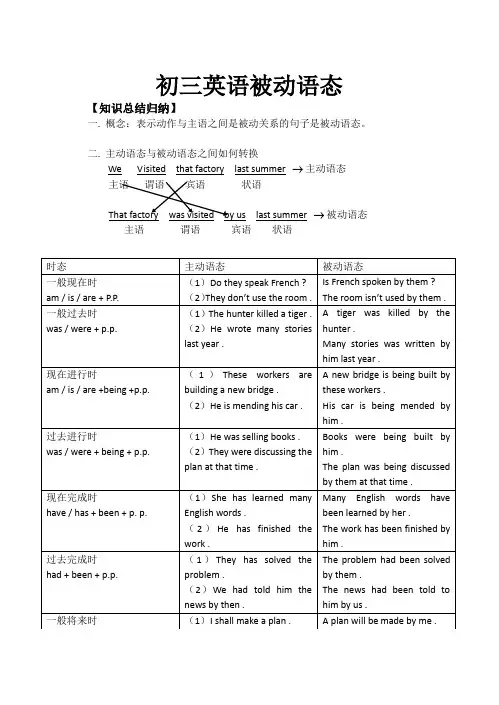
初三英语被动语态【知识总结归纳】一. 概念:表示动作与主语之间是被动关系的句子是被动语态。
二. 主动语态与被动语态之间如何转换We Visited that factory last summer →主动语态主语谓语宾语状语That factory was visited by us last summer →被动语态主语谓语宾语状语时态主动语态被动语态一般现在时am / is / are + P.P. (1)Do they speak French ?(2)They don’t use the room .Is French spoken by them ?The room isn’t used by them .一般过去时was / were + p.p. (1)The hunter killed a tiger .(2)He wrote many storieslast year .A tiger was killed by thehunter .Many stories was written byhim last year .现在进行时am / is / are +being +p.p. (1)These workers arebuilding a new bridge .(2)He is mending his car .A new bridge is being built bythese workers .His car is being mended byhim .过去进行时was / were + being + p.p. (1)He was selling books .(2)They were discussing theplan at that time .Books were being built byhim .The plan was being discussedby them at that time .现在完成时have / has + been + p. p. (1)She has learned manyEnglish words .(2)He has finished thework .Many English words havebeen learned by her .The work has been finished byhim .过去完成时had + been + p.p. (1)They has solved theproblem .(2)We had told him thenews by then .The problem had been solvedby them .The news had been told tohim by us .一般将来时(1)I shall make a plan . A plan will be made by me .四使用被动语态注意点1. 有些动词带有两个宾语,即直接宾语和间接宾语,变被动语态时,可把其中一个宾语变成主语,另一个留在被动结构谓语后面。


精锐教育网站:www.1smart.org - 1 - 精锐教育· 考试研究院 精锐教育学科教师辅导讲义 学员编号: 年 级:高一 课 时 数: 3 学员姓名: 辅导科目:英语 学科教师:
课 题 动词的语态
教学目的 掌握中考要求的八种时态的被动语态结构; 掌握情态动词can, may, must的被动语态的用法; 掌握带复合宾语,双宾语以及宾语从句的句子的被动语态句型。
教学内容
Step1: Greetings & Free talk How are you today? Is there something interesting or important this week? What have you learned in your school? (询问学校课程进度和知识掌握情况)
Step2: Warming-up: Cloze 难度 ★★☆☆☆ 时间 6 Shopping on the Internet or shopping on-line is becoming more and more popular. More and more people are using the Internet to buy things. Why do people use the Internet to shop? Some people say it is 1 .They don't have to leave their homes to order something, and they can shop for anything they want at any 2 — day or night. Other people say they can find things for sale that they can't find in the stores near their homes. Still other people say they can find better prices on the Internet. 3 you want to buy something on the Internet, you need a credit card. You have to type your credit card number and information on the website and send it to the store over the Internet. You have to be sure that the store will not use your information in the 4 way. Of course, you always have to be careful with your credit card number, because people sometimes 5 credit card numbers from stores and restaurants too. For people who are too nervous to shop on-line, the Internet is a good place to go window-shopping. Window-shopping is when you go to a store and look at the things for sale, but don't plan to buy anything. Window-shopping is easy on the Internet. You can see what kinds of products are 6 and how much they cost. You can visit stores with branches near you, 7 you can visit stores that are only on the Internet. 1. A. more expensive B. cheaper C. more difficult D. more convenient 2. A. time B. place C. shop D. home 3. A. As B. If C. As soon as D. Whether 4. A. quick B. easy C. wrong D. right 5. A. know B. buy C. borrow D. steal 6. A. cheap B. available C. popular D. modern 7. A. either B. both C. or D. yet
【答案与解析】 1. D 从后面句子意思如“购物不用离开家,任何时候都可购买,能买到附近其他商店买不到的东西”等进行概 精锐教育网站:www.1smart.org - 2 - 精锐教育· 考试研究院
括网上购物更方便。 2. A 是对后面day or night 的概括。 3. B 4. C 5. D 从 be careful with your credit card number (小心信用卡号码)进行判断。 6. B 通过网上浏览物品,可以知道你能买到什么东西。 7. C
Step 3: 被动语态用法梳理以及练习巩固。 (一) 课前目标检测 Ⅰ. Choose the best answer.
( ) 1. My birthday is coming. A nice present _________________ to me tomorrow. A. will be given B. will give C. is given D. was given ( ) 2. When and where _____________ the first Olympic Games _____________ ? A. are, held B. will be, held C. were, held D. did, hold ( ) 3. English ____________ also ____________ by people outside Britain and the USA. A. does, speak B. is, spoken C. is, speaking D. will, speak ( ) 4. Big Ben, the famous clock, _____________ all over the world on the B. B. C. A. can hear B. can be heard C. will be heard D. will hear
Ⅱ. Turn the following sentences into passive voice 1. People all over the world celebrate Christmas. Christmas____________ _____________ by people all over the world. 2. We can see Jinmao Building from here. Jinmao Building can_____________ _____________ from here. 3. The farmer will sell the cow at a high price. The cow _____________ ______________ sold at a high price. 4. Mr. Wang taught us English last term. English ______________ _______________ to us by Mr. Wang last term. 5. Where do they grow vegetables? Where _____________ vegetables _____________ ?
【Keys】 Ⅰ. 1-4 ACBB Ⅱ. 1. is celebrated 2. be seen 3. will be 4. was taught 5. are grown
(二) 用法梳理以及针对性练习 精锐教育网站:www.1smart.org - 3 - 精锐教育· 考试研究院
被动语态(一) 各个时态的被动语态 1.被动语态的用法: 当说话者强调的是动作本身,且没有必要知道动作的执行者是谁时,常使用被动语态。被动语态可避免提及动作的执行者,这样有利于对观点的陈述。在被动语态中,句子的主语是动作的承受者。
2.八种时态的主动变被动形式: 1)一般现在时的被动语态:主语(主动语态中的宾语)+is/are+过去分词 We keep the butter in the fridge. =>The butter is kept in the fridge.
2)一般过去时的被动语态:主语(主动语态中的宾语)+ was/were+过去分词 Jane painted a picture. =>A picture was painted by Jane.
3)一般将来时的被动语态:主语(主动语态中的宾语)+ will be+过去分词 The teacher will allow you to leave early. =>You will be allowed to leave early.
4)过去将来时的被动语态:主语(主动语态中的宾语) +would be+过去分词 I was sure people would punish him. =>1 was sure he would be punished.
5)现在进行时的被动语态:主语(主动语态中的宾语)十is/are being+过去分词 He is repairing my bike. =>My bike is being repaired by him.
6)过去进行时的被动语态:主语(主动语态中的宾语)+ was/were being十过去分词 He was making a model plane. =>A model plane was being made by him.
7)现在完成时的被动语态:主语(主动语态中的宾语)+ has/have been+过去分词 They have caught the thief. =>The thief has been caught.